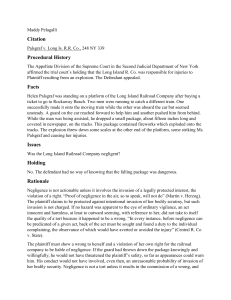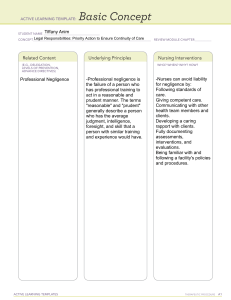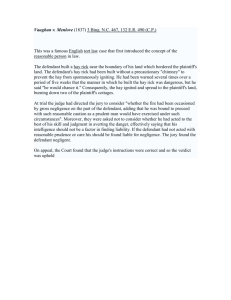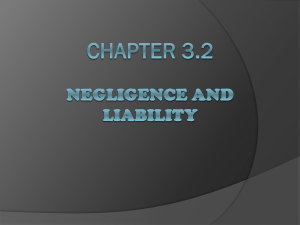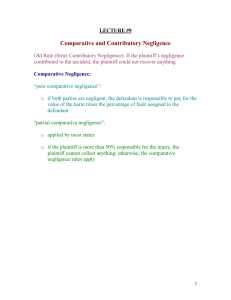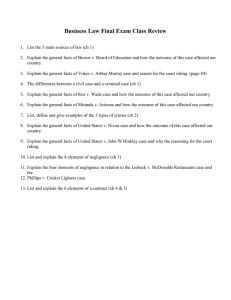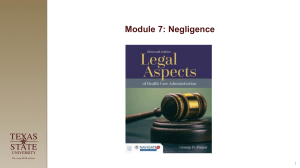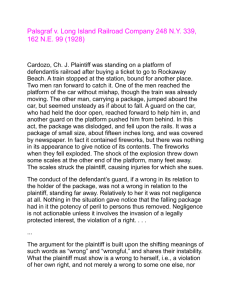Law Quiz No 2 – Negligence
advertisement
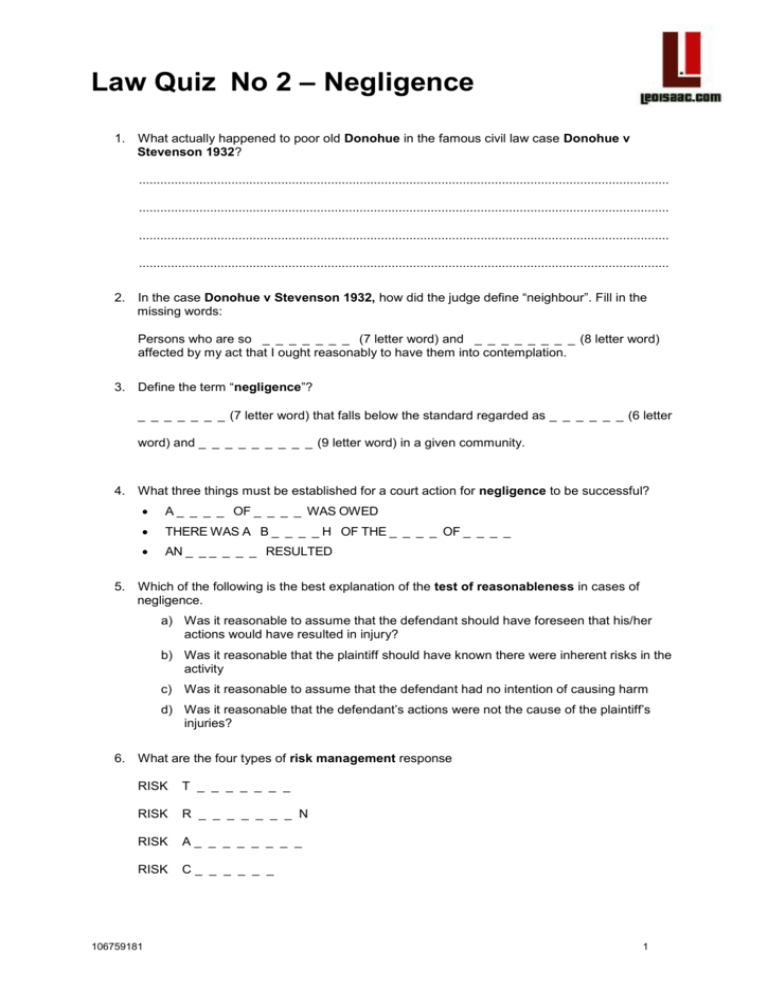
Law Quiz No 2 – Negligence 1. What actually happened to poor old Donohue in the famous civil law case Donohue v Stevenson 1932? ..................................................................................................................................................... ..................................................................................................................................................... ..................................................................................................................................................... ..................................................................................................................................................... 2. In the case Donohue v Stevenson 1932, how did the judge define “neighbour”. Fill in the missing words: Persons who are so _ _ _ _ _ _ _ (7 letter word) and _ _ _ _ _ _ _ _ (8 letter word) affected by my act that I ought reasonably to have them into contemplation. 3. Define the term “negligence”? _ _ _ _ _ _ _ (7 letter word) that falls below the standard regarded as _ _ _ _ _ _ (6 letter word) and _ _ _ _ _ _ _ _ _ (9 letter word) in a given community. 4. What three things must be established for a court action for negligence to be successful? A _ _ _ _ OF _ _ _ _ WAS OWED THERE WAS A B _ _ _ _ H OF THE _ _ _ _ OF _ _ _ _ AN _ _ _ _ _ _ RESULTED 5. Which of the following is the best explanation of the test of reasonableness in cases of negligence. a) Was it reasonable to assume that the defendant should have foreseen that his/her actions would have resulted in injury? b) Was it reasonable that the plaintiff should have known there were inherent risks in the activity c) Was it reasonable to assume that the defendant had no intention of causing harm d) Was it reasonable that the defendant’s actions were not the cause of the plaintiff’s injuries? 6. What are the four types of risk management response RISK T _ _ _ _ _ _ _ RISK R _ _ _ _ _ _ _ N RISK A_ _ _ _ _ _ _ _ RISK C_ _ _ _ _ _ 106759181 1 7. What is the type of insurance cover appropriate to Coaches that protects against being sued for malpractice? P_ _ F_ _ _ _ _ N _ _ I _ _ _ _ _ _ _ Y 8. What was the very important (non-rugby) principle with respect to safety that came out of the case of Watson v Haines (1987) where Watson was a schoolboy who broke his neck in a game of rugby. For schools and organisations providing sport and recreation activities, the duty of care extends to not withholding I _ _ _ _ _ _ _ _ _ N (11 letter word) that may help prevent injury. 9. A dog digs a hole in a football pitch at 6:00 pm on Friday night and at 9:30 am the following morning a player breaks a leg as a result of stepping in the hole at full speed. Make a list of the parties that the player could potentially sue to obtain compensation for his injury. ------------------------------------------------------------- ------------------------------------------------------------- ------------------------------------------------------------- ------------------------------------------------------------- ------------------------------------------------------------- ------------------------------------------------------------- ------------------------------------------------------------- ------------------------------------------------------------- ------------------------------------------------------------- ------------------------------------------------------------- 10. What must a coach due to reduce the risk of injury to partipants in their care. Fill in the blanks Not using _ _ _ _ _ _ _ _ _ (9 letter word) techniques or ill-advised training methods Check _ _ _ _ _ _ _ _ _ (9 letter word) Remove _ _ _ _ _ _ _ (7 letter word) players Not encourage _ _ _ _ _ _ _ _ _ _ (10 letter word) Not to promote drugs in sport, indiscriminate use of _ _ _ _ (4 letter word) _ _ _ _ _ _ _ (7 letter word). 106759181 2

